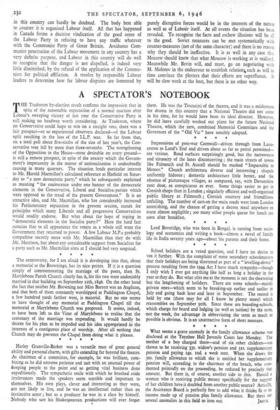A SPECTATOR'S NOTEBOOK
THE Tradeston by-election result confirms the impression that in spite of the reasonable expectation of a normal reaction after Labour's sweeping victory of last year the Conservative Party is still making no headway worth considering. At Tradeston, where no Conservative could hope to win on a straight vote, there was a fair prospect—or so experienced observers declared—of the Labour .split resulting in the loss of the I.L.P. seat. So far from that, on a total poll about five-sixths of the size of last year's, the Con- servative vote fell by more than three-sevenths. The strengthening of the Opposition in the House—most desirable on every ground— is still a remote prospect, in spite of the anxiety which the Govern- ment's impetuosity in the matter of nationalisation is undoubtedly causing in many quarters. The situation lends particular interest to Mr. Harold Macmillan's calculated reference at Hatfield on Satur- day to "a new democratic party," which he subsequently explained as meaning "the coalescence under one banner of the democratic elements in the Conservative, Liberal and Socialist,' parties which were opposed to the trend of the present Government." It is an attractive idea, and Mr. Macmillan, who has considerably increased his Parliamentary reputation in the present session, stands for principles which many Liberals and all progressive Conservatives would readily endorse. But what about the hope of roping in "democratic elements in the Socialist party?" Here the hard fact remains that to all appearance the voters as a whole still want the Government they returned to power. A few Labour M.P.s probably sympathise secretly more with Mr. Macmillan than they do with Mr. Morrison, but about any considerable support from Socialists for a party such as Mr. Macmillan aims at I should feel very sceptical.


























 Previous page
Previous page